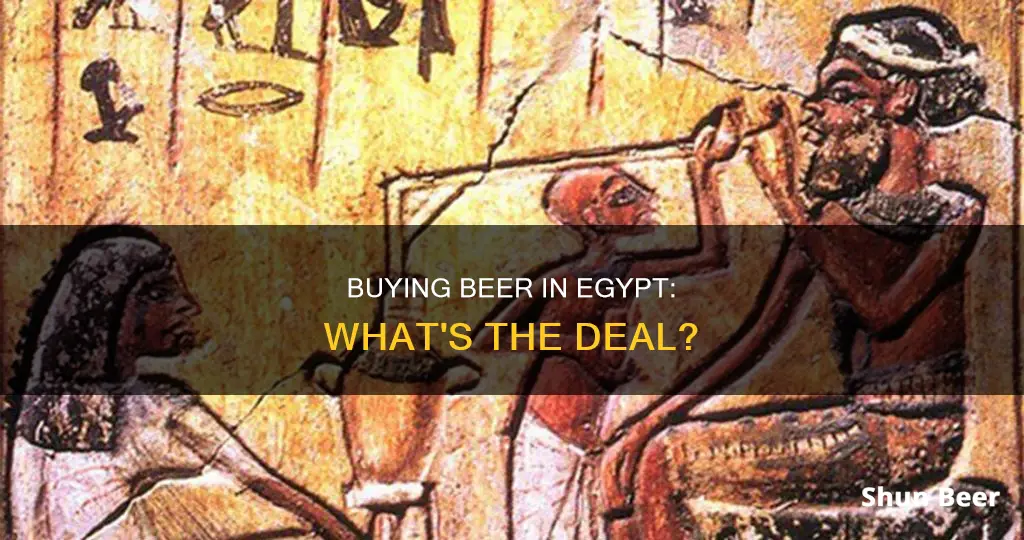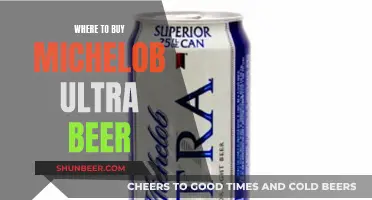
Egypt has a long history of brewing beer, dating back to ancient times when it was introduced by the god Osiris. In modern times, however, the predominantly Muslim country has a complex relationship with alcohol. While it is possible to purchase beer in Egypt, the sale and consumption of alcohol are regulated and vary across different regions and social circles. In this article, we will explore the topic of buying beer in Egypt, including the cultural and religious nuances surrounding alcohol consumption in the country.
| Characteristics | Values |
|---|---|
| Availability of alcohol | Alcohol is available in Egypt, but the sale and consumption are regulated. It is easier to access in urban areas, while in rural regions, it might be limited or absent. |
| Drinking culture | Drinking culture in Egypt varies. While some Egyptians consume alcohol, the predominantly Muslim culture means it is not central to everyone's social life. Drinking culture in Cairo ranges from underground and forbidden to openly cosmopolitan. |
| Types of alcohol | Beer, wine, and spirits are available in Egypt. Local beers include Sakkara and Luxor Lager, while Stella is the most famous brand, produced in Egypt since the 19th century. Other alcoholic beverages include brandy and Zibiba. |
| Places to buy alcohol | Alcohol can be purchased in liquor stores, hotel and independent bars, pubs, discos, and restaurants throughout Egypt. Drinkies is one of the only liquor store chains in Egypt. |
| Price of alcohol | Alcohol in Egypt is expensive due to high taxes and import costs. Prices may vary depending on the location, with higher prices in tourist areas and five-star hotels. |
| Alcohol during Ramadan | Alcohol is available during Ramadan, especially in tourist areas. However, availability may be limited during this holy month out of respect for local customs. |
What You'll Learn
- Beer is widely available in Egypt, including in bars, pubs, and liquor stores
- Alcohol is more easily accessible in affluent neighbourhoods
- Tourists can buy alcohol in Egypt, and it is readily available in most resorts
- Drinking alcohol in public places is prohibited, except in hotels and tourist facilities
- Home-brewing is relatively popular, but it is recommended to only consume alcohol prepared in a professional environment

Beer is widely available in Egypt, including in bars, pubs, and liquor stores
In ancient Egypt, beer was known as 'hqt' and 'zythus', and it transcended social classes, being consumed by both labourers and gods. It was a nutritious, sweet, and thick beverage, and it was key to religious ceremonies and daily life.
Today, you can find beer in most resorts, and in the bustling cosmopolitan cities of Egypt, such as Cairo. The upscale districts of Cairo, such as Zamalek, Maadi, and Heliopolis, are home to British-style pubs, bars, and air-conditioned liquor stores. Buying and consuming alcohol in these affluent neighbourhoods is socially acceptable and effortless.
There are several well-known beer brands in Egypt, with Stella being the most famous. It has been manufactured in Egypt since the 19th century and is widely consumed by Egyptians and experienced travellers alike. You will not find a single bar in Egypt that doesn't sell Stella or even have the Stella logo. Other popular beer brands in Egypt include Heineken, Meister, Sakkara, and Desperados.
Liquor stores in Egypt include chains such as Drinkies, which is the official store of Al-Ahram beverages, and smaller independent stores. Alcoholic beverages can also be purchased in many hotel and independent bars, pubs, discos, and restaurants throughout Egypt.
Best Places to Buy Red Stripe Beer
You may want to see also

Alcohol is more easily accessible in affluent neighbourhoods
The upscale districts of Cairo, such as Zamalek, Maadi, and Heliopolis, are known for their affluent residents and vibrant nightlife scenes. These areas boast British-style pubs, trendy nightclubs, and air-conditioned liquor shops. Buying and consuming alcohol in these neighbourhoods is socially acceptable and effortless. The presence of embassies and diplomatic missions in Zamalek, for example, contributes to the heavy security and easy accessibility of the area.
In contrast, purchasing alcohol in low- to middle-class neighbourhoods like Giza and Sayeda Zeinab can be a risky endeavour, akin to a clandestine drug deal. The social stigma surrounding alcohol in these areas leads to discreet transactions, with customers often concealing their purchases in plastic bags.
The availability and accessibility of alcohol in Egypt vary significantly between different socioeconomic areas. While affluent neighbourhoods offer a wide array of drinking establishments and liquor stores, lower-income areas present challenges and social taboos that make acquiring alcohol more difficult and clandestine. This disparity reflects the multifaceted nature of Egypt's relationship with alcohol, where ancient customs and modern lifestyles coexist within a predominantly Muslim society.
Buying Beer in Mississippi: Legal Hours and Availability
You may want to see also

Tourists can buy alcohol in Egypt, and it is readily available in most resorts
Alcohol is available for tourists in Egypt, especially in tourist areas and resorts. While Egypt is a predominantly Muslim country, and many locals abstain from alcohol, it is still possible to find liquor stores and bars in some upmarket neighbourhoods, and alcohol is served in many hotels and resorts.
Egypt has a long history of brewing beer, dating back to ancient times. In modern times, the country's relationship with alcohol is complex and multifaceted, with a variety of factors influencing its consumption. In cosmopolitan cities like Cairo, drinking culture exists on a spectrum, from underground and forbidden to openly cosmopolitan. The availability and acceptability of alcohol often depend on the neighbourhood and social circle. For example, in affluent areas like Zamalek, Maadi, and Heliopolis, purchasing and consuming alcohol are generally socially acceptable. In contrast, in lower- to middle-class neighbourhoods like Giza and Sayeda Zeinab, buying alcohol can be challenging and may even resemble a drug deal.
Egypt's alcohol industry is heavily regulated, and acquiring new liquor licenses is difficult for aspiring bars, retail stores, and hotels. These strict regulations, along with high taxes and import costs, contribute to the high prices of alcohol in the country. Despite these challenges, alcohol remains a part of Egypt's cultural landscape, with local beers like Stella, Sakkara, and Luxor Lager, and wines like Omar Khayyam, available in most resorts.
It is worth noting that public intoxication is strongly discouraged in Egypt and can even lead to legal issues. Additionally, during the holy month of Ramadan, alcohol availability may be limited out of respect for local customs. As a tourist, it is important to be mindful of these cultural nuances and exercise discretion and sensitivity when consuming alcohol in Egypt.
Virginia's Beer Buying Laws: What You Need to Know
You may want to see also

Drinking alcohol in public places is prohibited, except in hotels and tourist facilities
Drinking alcohol in public places is prohibited in Egypt. This means that you cannot drink in parks, on the streets, or in other public spaces. However, there are exceptions to this rule, including hotels and tourist facilities approved by the Minister of Tourism. As a tourist, you can also buy alcohol from liquor stores and bars in some upmarket neighbourhoods, and many hotels and resorts will serve alcohol.
Egypt's relationship with alcohol is complex. While the country has been brewing beer for 3,000 years, it is also a predominantly Muslim society, and many locals abstain from alcohol completely. This has resulted in a somewhat clandestine drinking culture, particularly in low- to middle-class neighbourhoods like Giza and Sayeda Zeinab, where buying alcohol can be a risky endeavour.
In contrast, affluent neighbourhoods like Zamalek, Maadi, and Heliopolis offer a variety of drinking establishments, including British-style pubs, trendy nightclubs, and air-conditioned liquor shops. Drinking alcohol in these areas is more socially acceptable and accessible.
For tourists, it is important to note that alcohol is typically more expensive in Egypt due to high taxes and import costs. Additionally, alcohol availability may be limited during Ramadan and Islamic holy days, as a sign of respect for local customs and traditions.
When consuming alcohol in Egypt, it is essential to do so responsibly and discreetly. Public intoxication is frowned upon and can lead to legal issues. It is also advisable to avoid drinking tap water and to be cautious when consuming alcohol prepared outside of professional establishments.
Ginger Beer: Age Limit for Purchase?
You may want to see also

Home-brewing is relatively popular, but it is recommended to only consume alcohol prepared in a professional environment
Alcohol is available in Egypt, and tourists can certainly enjoy a drink while visiting. However, as a predominantly Muslim country, alcohol is not a central part of Egyptian social life and is heavily regulated. The availability of alcohol varies across the country, with urban areas offering easier access than rural regions.
Home-brewing is relatively popular in Egypt, but it is recommended to exercise caution when consuming alcohol that is not prepared in a professional environment. Travellers are advised to only consume alcohol that has been professionally prepared to avoid any health risks. This is an important consideration, especially when visiting a new country.
The quality of home-brewed alcohol can be questionable, and it may not adhere to the same safety standards as professionally produced alcohol. There may be a higher risk of contamination or the use of unsafe ingredients in home-brewed alcohol. Additionally, the consumption of alcohol prepared in a professional environment aligns with respecting local customs and sensibilities.
Egypt has a rich history of alcohol production, especially beer, which dates back to ancient times. Beer was a staple in the ancient Egyptian diet, consumed by both the working class and royalty. Today, Egypt has a modern beer industry, with popular brands like Stella, Sakkara, and Luxor Lager. These beers are widely available and offer a taste of Egypt's brewing heritage.
When consuming alcohol in Egypt, it is important to drink responsibly and adhere to local customs and laws. Public intoxication is frowned upon and can lead to legal issues. Additionally, alcohol availability may be limited during religious periods, such as Ramadan, out of respect for local traditions.
Buying Beer: When Can You Legally Purchase It?
You may want to see also







